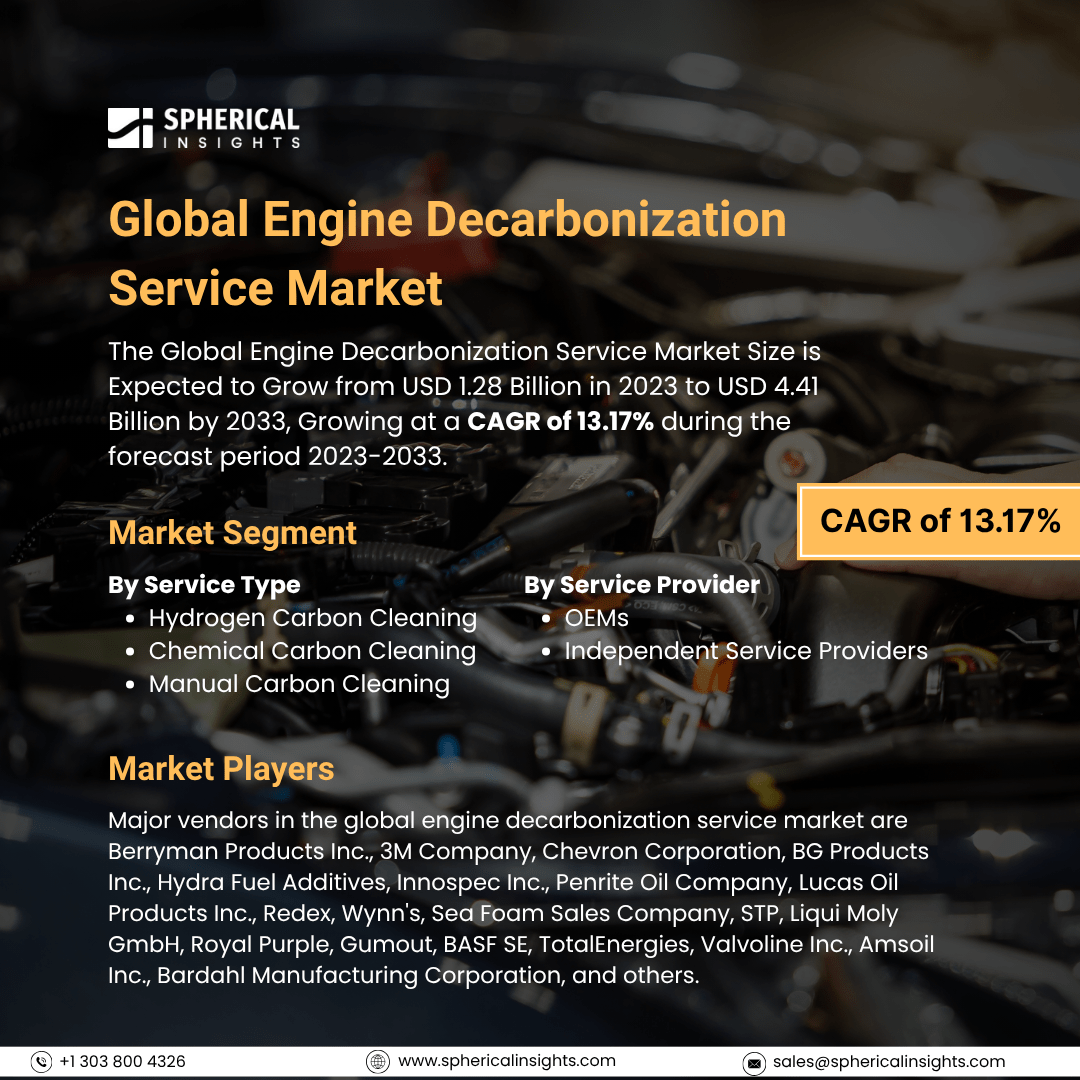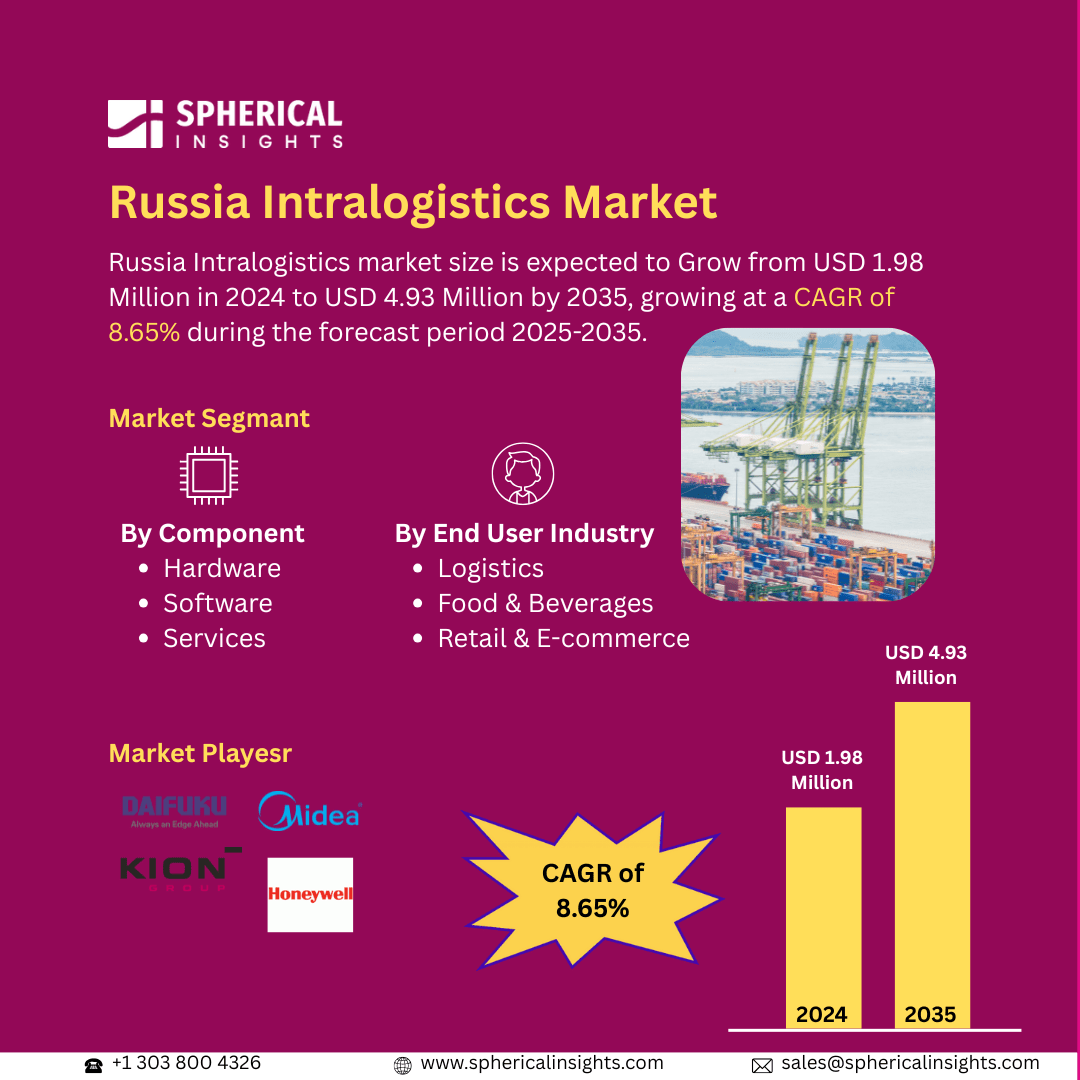Global Engine Decarbonization Service Market Size To Exceed USD 4.41 Billion By 2033
According to a research report published by Spherical Insights & Consulting, The Global Engine Decarbonization Service Market Size is Expected to Grow from USD 1.28 Billion in 2023 to USD 4.41 Billion by 2033, Growing at a CAGR of 13.17% during the forecast period 2023-2033.
Browse 210 market data Tables and 45 Figures spread through 190 Pages and in-depth TOC on the Global Engine Decarbonization Service Market Size, Share, and COVID-19 Impact Analysis, By Service Type (Hydrogen Carbon Cleaning, Chemical Carbon Cleaning, Manual Carbon Cleaning), By Service Provider (OEMs, Independent Service Providers), and By Region (North America, Europe, Asia-Pacific, Latin America, Middle East, And Africa), Analysis and Forecast 2023 - 2033
The international engine decarbonization service market refers to the business that focuses on carbon emissions from engine-powered systems, such as vehicles, industrial machinery, and power plants. These services may include fuel alternatives, advanced combustion processes, carbon capture, and engine modifications. The market is driven by the global push for growing environmental awareness and stricter emission laws. Moreover, technological development boosts the market expansion. Further, growing awareness about the vehicles 'upkeep drives the market growth. However, the market growth is restricted by high initial costs.
The hydrogen carbon cleaning segment dominated the global engine decarbonization service market in 2023 and is anticipated to grow at a substantial CAGR over the forecast period.
On the basis of the service type, the global engine decarbonization service market is classified into hydrogen carbon cleaning, chemical carbon cleaning, and manual carbon cleaning. Among these, the hydrogen carbon cleaning segment dominated the global engine decarbonization service market in 2023 and is anticipated to grow at a substantial CAGR over the forecast period. This is due to its sustainability and could increase engine performance and fuel efficiency.
The OEMs segment accounted for the highest share of the global engine decarbonization service market in 2023 and is projected to grow at a significant CAGR over the forecast period.
On the basis of the service provider, the global engine decarbonization service market is segmented into OEMs and independent service providers. Among these, the OEMs segment accounted for the highest share of the global engine decarbonization service market in 2023 and is projected to grow at a significant CAGR over the forecast period. This segmental growth is driven by providing specialist decarbonization services as part of their all-inclusive maintenance packages, and by their reputation and trustworthiness.
Asia Pacific is anticipated to hold the largest share of the global engine decarbonization service market over the forecast period.
Asia Pacific is expected to hold the greatest share of the global engine decarbonization service market over the forecast period. The regional market growth is influenced by government programs targeted at lowering vehicle emissions. Furthermore, in nations like China, India, and Japan, the rising automobile industry and increased car ownership are contributing to the need for auto repair services, which drives the market expansion.
North America is predicted to grow at the fastest CAGR of the global engine decarbonization service market over the forecast period. The regional market growth is driven by high vehicle ownership rates and strict emission restrictions, along with the prevalence of reputable car repair shops and growing awareness of automotive upkeep. Moreover, the United States and Canada are the key marketplaces that contributed to the market growth due to the developed automotive sector.
Company Profiling
Major vendors in the global engine decarbonization service market are Berryman Products Inc., 3M Company, Chevron Corporation, BG Products Inc., Hydra Fuel Additives, Innospec Inc., Penrite Oil Company, Lucas Oil Products Inc., Redex, Wynn's, Sea Foam Sales Company, STP, Liqui Moly GmbH, Royal Purple, Gumout, BASF SE, TotalEnergies, Valvoline Inc., Amsoil Inc., Bardahl Manufacturing Corporation, and others.
Key Target Audience
- Market Players
- Investors
- End-users
- Government Authorities
- Consulting And Research Firm
- Venture capitalists
- Value-Added Resellers (VARs)
Recent Development
- In February 2025, Wärtsilä took a significant step in its decarbonisation journey by committing to reduce 25% of greenhouse gas emissions from its Tier 1 direct suppliers by 2030. This initiative was part of Wärtsilä's broader "Set for 30" targets, which aimed for carbon neutrality in its operations and a product portfolio ready for zero-carbon fuels by 2030.
Market Segment
This study forecasts revenue at global, regional, and country levels from 2023 to 2033. Spherical Insights has segmented the global engine decarbonization service market based on the below-mentioned segments:
Global Engine Decarbonization Service Market, By Service Type
- Hydrogen Carbon Cleaning
- Chemical Carbon Cleaning
- Manual Carbon Cleaning
Global Engine Decarbonization Service Market, By Service Provider
- OEMs
- Independent Service Providers
Global Engine Decarbonization Service Market, By Regional
- North America
- Europe
- Germany
- UK
- France
- Italy
- Spain
- Russia
- Rest of Europe
- Asia Pacific
- China
- Japan
- India
- South Korea
- Australia
- Rest of Asia Pacific
- South America
- Brazil
- Argentina
- Rest of South America
- Middle East & Africa
- UAE
- Saudi Arabia
- Qatar
- South Africa
- Rest of the Middle East & Africa



